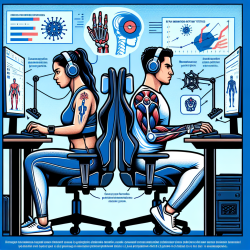Introduction
The recent research article titled "Virtual Summer Undergraduate Mentorship Program for Students Underrepresented in Medicine Yields Significant Increases in Self-Efficacy Measurements During COVID-19 Pandemic: A Mixed Methods Evaluation" provides insightful data on the effectiveness of virtual mentorship programs. This research is particularly relevant for practitioners in the field of speech-language pathology and online therapy services, like those offered by TinyEYE, as it highlights the potential of virtual platforms to enhance self-efficacy among participants.
Key Findings
The study conducted by Stephenson-Hunter et al. (2021) focused on a virtual mentorship program aimed at underrepresented students in medicine (URiM) during the COVID-19 pandemic. The results demonstrated significant improvements in self-efficacy measurements among participants. This was achieved through a structured virtual program that provided socioemotional support and career guidance, despite the challenges posed by the pandemic.
Implications for Practitioners
For practitioners in speech-language pathology and online therapy, the outcomes of this study suggest several actionable strategies:
- Embrace Virtual Platforms: The success of the virtual mentorship program underscores the potential of online platforms to deliver effective therapy and mentorship. Practitioners should leverage these tools to reach a broader audience and provide consistent support.
- Focus on Self-Efficacy: Enhancing self-efficacy is crucial for client progress. Practitioners can incorporate strategies from the study, such as providing structured feedback and fostering a supportive environment, to boost clients' confidence in their abilities.
- Continuous Evaluation: Regular assessment of program outcomes, as demonstrated in the study, is essential. Practitioners should adopt a data-driven approach to evaluate the effectiveness of their interventions and make necessary adjustments.
Encouraging Further Research
While the study provides valuable insights, it also highlights the need for ongoing research in virtual mentorship and therapy. Practitioners are encouraged to explore further studies on the long-term impact of virtual interventions and the specific factors that contribute to their success. This will not only enhance their practice but also contribute to the broader field of speech-language pathology.
Conclusion
The research by Stephenson-Hunter et al. (2021) offers a compelling case for the effectiveness of virtual mentorship programs. By adopting similar strategies, practitioners can improve their skills and outcomes for their clients, particularly in challenging times like the COVID-19 pandemic. To delve deeper into the findings and methodologies of the study, practitioners can access the full research paper through this link: Virtual Summer Undergraduate Mentorship Program for Students Underrepresented in Medicine Yields Significant Increases in Self-Efficacy Measurements During COVID-19 Pandemic: A Mixed Methods Evaluation.










